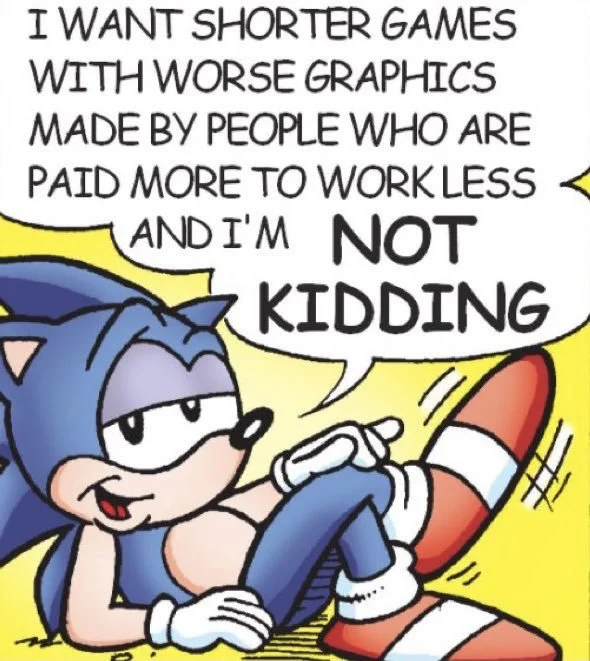I want shorter games with worse graphics

The triple-A game industry has gotten to the point of being absurdly, unsustainably bloated. Here are some of the reasons why, in my opinion, Shorter Games may actually be the right creative direction for the industry to take as a whole.
Development cycles can reach 5-7 years at this point, meaning any large, sprawling project can be an enormous risk.
While some developers make use of that big ass time window (see Baldur's Gate 3), in reality this means a lot more Starfields. When you're taking enormous risks in terms of financing and development huge games, and publishers have to meet certain quotas, there's less and less room for video games that target limited audiences.
But... longer time means more quality!
In ideal circumstances, holy shit this is absolutely true. I'm not fundamentally against long development cycles and giving a project plenty of time to brew if it's actually used properly, but for every passion project from an indie studio there's false promises.
The longer a game takes to release, the more "out of touch" it is with the current state of development.
Plenty of games releasing in 2023 are rocking old engines or technology, but outside of old tech, this can be as simple as a game with political commentary shipping out dated or having dialogue that belongs in 2018. My point is, the longer a game takes to ship out, and the longer it stays insulated as a project stewing, the more it ages. This means it's a lot harder to push the envelope of innovation.
To be fair, at the same time, constant innovation and pushing new engines and graphics technologies generally makes games harder to run and less accessible for a portion of gamers.
It needs to be made incredibly clear that many, MANY studios nowadays are struggling.
A large amount of studios burn money like a teenage girl at the mall, between marketing, salaries, and a ton of other expenses.
When you're barely above the red, ANYTHING will help you continue going. Even if your game developed in the last 5 years is not ready, shipping SOMETHING out during that time means money's brought in. We live in an era where software and game patches can be done incredibly efficiently and quickly. When severely over-scoped video games need funding to stay in the green, what better way to get funds to feed your developers than to drop a shoddy release and scrape together funds from the poor souls willing to buy it?
Cyberpunk's a great example of a game forced to crumble under the weight of a studio aiming for an incredibly large scale project, and not delivering at launch. Nowadays, with the Phantom Liberty DLC, it's viewed by most as a very solid RPG, but it took them a damn long time to reach that point. I'm all for innovation and pushing boundaries, but the scale in which so many games release is plain unsustainable and incredibly difficult to do in this current climate.
What about the "worse graphics" part?
I don't agree with it at all and think this point is silly. Video games should look good and push the envelope of what's possible visually. I do think there are plenty of bland-looking hyper-realistic games out nowadays, but there's nothing inherently wrong with realism and there's plenty of degrees of separation between indie pixel art or cel-shaded game and the latest nice-looking UE5 game.
You all knew this, but what matters more in a video game is solid art direction. Cohesive visual design tied with graphical advancements create incredible products, and it's a lot easier to do BOTH when your game is smaller in scale. It's also generally easier to optimize a game with less assets and moving parts to worry about.
Easily accessible upscaling tech exists and is more and more prevalent
PC gamers have been given the ability to use Nvidia's Deep Learning Super Sampling and AMD's FidelityFX Super Resolution for a little while now, offering algorithms to run intensive games at lower resolutions scaled up to their display's. This opens the door for a lot of taxing games to run on older hardware. The Steam Deck is a great example of a device that can use FSR to run powerful games. Even the struggling tablet hardware on the Nintendo Switch takes advantage of FSR to run games like Tears of the Kingdom at acceptable performance.
The industry will not correct itself, unless gamers decide to change
Long development cycles and expansive, sprawling video games may become the new norm, but they are absolutely NOT something that we can adjust to. Notice how the PS5 is about 5 years old and is just now seeing any semblance of games designed specifically to run on it. Plenty of PS4 games just never really finished development as its younger sibling came out, and most consoles ultimately have a lifespan of about 7 years.
So, what can we do?
Off the bat, support indie developers. They kinda just do their own thing and it seems to work pretty well. There's a lot of quality content coming out of that sphere, but these guys also need to put food on the table.
Consumer activism is generally not a very effective strategy, unfortunately. I think that as a whole, the industry and its development trends will see a dramatic shift as gamers begin to get tired of open world formulas in video games. Ideally, they'd become an ambitious exception, rather than the norm that everyone defaults to.
M.